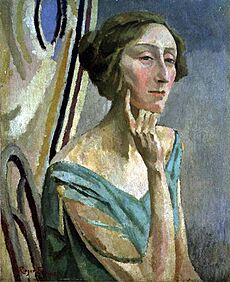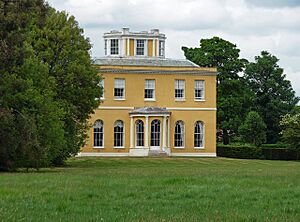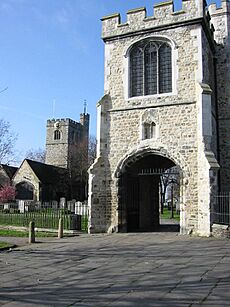Tom Driberg facts for kids
Quick facts for kids
The Lord Bradwell
|
|
|---|---|
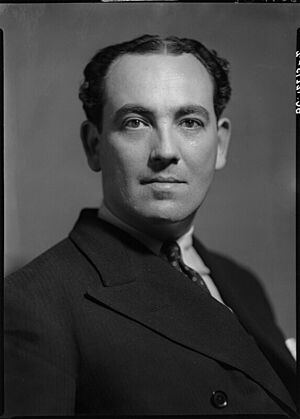
Driberg in 1941
|
|
| Chairman of the Labour Party | |
| In office 1957–1958 |
|
| Leader | Hugh Gaitskell |
| Preceded by | Margaret Herbison |
| Succeeded by | Barbara Castle |
| Member of Parliament for Maldon |
|
| In office 25 June 1942 – 6 May 1955 |
|
| Preceded by | Sir Edward Ruggles-Brise |
| Succeeded by | Alastair Harrison |
| Member of Parliament for Barking |
|
| In office 8 October 1959 – 8 February 1974 |
|
| Preceded by | Somerville Hastings |
| Succeeded by | Jo Richardson |
| Personal details | |
| Born |
Thomas Edward Neil Driberg
22 May 1905 Crowborough, Sussex, England |
| Died | 12 August 1976 (aged 71) Paddington, London, England |
| Resting place | Bradwell Cemetery, Bradwell-on-Sea |
| Political party | Labour |
| Other political affiliations |
Communist Party of Great Britain |
| Spouse |
Ena Mary Driberg
(m. 1951) |
| Residences | Bradwell Lodge, Bradwell-on-Sea, England |
| Occupation | Journalist, politician |
Thomas Edward Neil Driberg, Baron Bradwell (22 May 1905 – 12 August 1976) was a British journalist and politician. He served as a Member of Parliament (MP) for two different areas, from 1942 to 1955, and again from 1959 to 1974. He was a member of the Communist Party of Great Britain for many years before joining the Labour Party in 1945. Even though he never became a government minister, he was an important person in left-wing politics for a long time.
Driberg was the son of a retired officer. He studied at Lancing College and Christ Church, Oxford. After leaving university, he became a reporter and later a columnist for the Daily Express. He wrote a popular column called "William Hickey" from 1933 to 1943. He also wrote for other newspapers and journals. He wrote several books, including about the newspaper owner Lord Beaverbrook. After leaving the House of Commons in 1974, he was given the title Baron Bradwell.
Driberg was also a devoted follower of a specific Christian tradition called Anglo-Catholicism. After his death, there were some stories about his possible involvement with spy agencies, but the full truth of these claims is not clear.
Contents
Early Life and Education
Family and Childhood in Crowborough
Thomas Driberg was born on May 22, 1905, in Crowborough, a town about 40 miles (64 km) south of London. He was the youngest of three sons. His father, John James Street Driberg, had worked in the Indian Civil Service and was 65 years old when Tom was born. His mother was Amy Mary Irving Driberg. The Driberg family had moved from Holland about 200 years before, and his mother's family was from Scotland.
Growing up mostly alone with his older parents was not easy for Tom. He later said that thinking about Crowborough made him feel "sick horror."
When he was eight, Driberg started at the Grange school in Crowborough. He learned about life from other boys and discovered what he called "exotic" religion, which was a type of High Anglicanism. These experiences, along with his later interest in left-wing politics, became very important parts of his life.
School Days at Lancing College
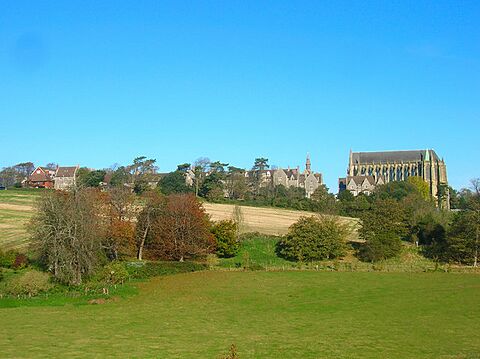
In 1918, at age 13, Driberg went to Lancing College, a public school near Worthing. After some difficult times, he became friends with another student, Evelyn Waugh. With Waugh's help, Driberg joined an intellectual group called the Dilettanti, which focused on literature, art, and political discussions. He started writing poetry. A teacher named J. F. Roxburgh also helped him learn about art.
Lancing's Gothic chapel provided the religious atmosphere Driberg liked. By 1920, he was interested in left-wing politics and was rebelling against his family's conservative views. He joined the Brighton branch of the new Communist Party of Great Britain.
Driberg became a responsible student at Lancing, holding positions like deputy head boy and head librarian. However, his time at Lancing ended suddenly in 1923. He had to leave the school, supposedly to get private lessons for his Oxford entrance exam, which he had failed. Back in Crowborough, he studied hard and won a scholarship to Christ Church, Oxford.
University Life at Oxford
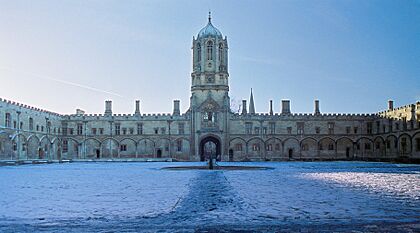
Oxford in 1924 was a lively place with new artistic movements. Driberg quickly became involved in a world of art, politics, poetry, and parties. He later wrote that there was "just no time for any academic work." With his friend W. H. Auden, he discovered T. S. Eliot's The Waste Land, which they loved. One of Driberg's poems was published in Oxford Poetry 1926. He even met the famous poet Edith Sitwell, who told him he was "the hope of English poetry."
Driberg and the future historian A. J. P. Taylor formed the Oxford University Communist Party. During the General Strike of 1926 in May 1926, most Oxford students helped the government. But Driberg and Taylor offered to help the British Communist Party in London. Driberg was arrested by the police before he could start distributing strike information. This ended his active role in the strike. Despite his left-wing connections, he still got 75 votes in the 1927 elections for the president of the Oxford Union.
Throughout his time at Oxford, Driberg regularly attended Mass at Pusey House. This was a religious place that aimed to bring back Catholic traditions to the Church of England.
Driberg also created a funny event called "Homage to Beethoven," which involved megaphones and typewriters. This event caught the attention of Aleister Crowley, a writer interested in unusual beliefs. Driberg met Crowley several times. These many activities outside of his studies meant he didn't focus on his academic work. He failed his final exams and left Oxford in the summer of 1927 without a degree.
Journalism Career
"The Talk of London" Column
After leaving Oxford, Driberg struggled financially in London. He tried to become a poet and took odd jobs. He stayed in touch with Edith Sitwell, who helped him get an interview with the Daily Express. In January 1928, he started a six-week trial as a reporter.
Within a month, Driberg wrote an important story about the American speaker Frank Buchman in Oxford. Driberg's reports were often critical, which led to complaints. However, his trial period was extended. In July 1928, he wrote an exclusive report about a society party, which showed his good social connections. This led to a permanent job with the Express, helping with a daily column called "The Talk of London." Driberg later said he used this column to make fun of the wealthy, hoping to make working-class people angry and help the Communist Party.
Driberg used the column to introduce readers to new social and literary figures. He also wrote about more serious topics like capital punishment and modern architecture. In September 1930, he discreetly announced his friend Evelyn Waugh's conversion to Roman Catholicism in the column.
Becoming William Hickey
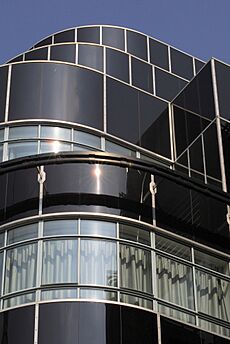
In 1932, Driberg took over "The Talk of London" column entirely. He felt frustrated with how unimportant his work seemed. The owner of the Express, Lord Beaverbrook, decided to relaunch the column in May 1933 as "These Names Make News," with the new name "William Hickey" as the writer. Driberg described it as a column about "men and women who matter." Historian David Kynaston called Driberg the "founder of the modern gossip column," though it soon started focusing more on social and political issues.
Beaverbrook liked Driberg and was amused by his left-wing views combined with his fancy lifestyle. Beaverbrook often helped Driberg with money problems.
In the late 1930s, Driberg traveled a lot. He went to Spain to see the Spanish Civil War, to Germany after the Munich Agreement in 1938, and to New York for the 1939 New York World's Fair. After the Nazi-Soviet Pact was announced in August 1939, he wrongly told his readers there would be "no war." Nine days later, after Germany invaded Poland and started World War II, he apologized. His support for the war in September 1939 might have led to his removal from the Communist Party in 1941.
Driberg's mother died in July 1939. With his inheritance and a loan, he bought and fixed up Bradwell Lodge, a country house in Bradwell-on-Sea. He lived there until the Royal Air Force took it over in 1940. He continued to write the Hickey column, even when his editor disagreed with his views, such as his protests against bombing German civilians. In November 1941, he went to America and reported on President Roosevelt's speech announcing America's entry into the war after the attack on Pearl Harbor.
Early Parliamentary Career
Independent Member for Maldon (1942–1945)
When Driberg returned to Britain in March 1942, many people were unhappy with how the government was handling the war. This led to independent candidates winning several special elections. On May 12, 1942, the Conservative MP for Maldon died. The next day, Driberg asked for time off from his column to run in the special election. The Daily Express did not support him.
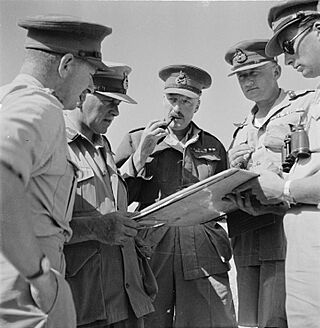
Driberg's campaign slogan was "A Candid Friend For Churchill," meaning he supported the prime minister but would also criticize his government. His opponent's weak campaign helped Driberg gain support from many different groups. His fame as "William Hickey" and being the only candidate who lived in the area also helped him. His past connections to the Communist Party were not revealed. On June 25, he won the election by 6,000 votes, overturning a large Conservative lead.
On July 2, 1942, Driberg voted for the first time in the House of Commons, supporting Churchill against a motion to criticize the government. Driberg gave his first speech on July 7, talking about propaganda. He asked for the ban on the Communist Party's newspaper, the Daily Worker, to be lifted, saying it could help with wartime propaganda.
In the following months, he asked questions and spoke in debates about various social issues. For example, on September 29, 1942, he asked the prime minister to tell American military authorities that racial segregation was not a custom in Britain. He continued to write the Hickey column and used his parliamentary salary to pay for an office in Maldon.
In June 1943, the Express editor fired Driberg over a story that was bad for a government minister. Driberg then started writing for Reynolds News, a Sunday newspaper, and for the New Statesman. He also contributed to a BBC broadcast until he was banned in October 1943 due to government pressure. He reported on the Allied advances in France and Belgium after D-Day as a war correspondent. In April 1945, he visited the Buchenwald concentration camp after its liberation.
Labour Member (1945–1955)

In the general election of July 1945, Driberg won his seat in Maldon by an even larger margin. Before the election, he had joined the Labour Party. He was one of 393 Labour MPs who won, leading to Clement Attlee becoming prime minister instead of Churchill.
Soon after his victory, Driberg went to the Far East to report on the conditions of Allied troops in Burma. He also visited Saigon and offered to help with Ho Chi Minh, who had declared an independent Vietnam state. Driberg later believed that if his offer had been accepted, he might have prevented the Vietnam War.
Because of his journalism, Driberg was well-known in the Labour Party. In 1949, he was elected to the party's National Executive Committee (NEC). In the February 1950 general election, he was re-elected at Maldon.
In August 1950, Driberg went to Korea, where Britain had joined the United States in a United Nations military mission. Driberg and some other left-wing MPs had disagreed with Britain's involvement. Despite his reservations, Driberg's reports from the war supported the British troops. He was away from parliament for three months, missing many important votes. When he returned, his fellow Labour MPs criticized him for neglecting his duties. However, his standing in the party remained strong, and he was re-elected to the NEC in September 1950.
In April 1951, three government ministers resigned over new charges for medical prescriptions. Driberg supported these ministers. In the October 1951 general election, the Labour Party lost, and Churchill became prime minister again. Driberg kept his Maldon seat by a small number of votes. He had never sought a government position. He still enjoyed parts of his parliamentary life, like showing the American singer Johnnie Ray around the House of Commons in 1953.
However, he needed to earn more money. In 1952, he decided to write a book about Lord Beaverbrook. The project took several years, and by the time it was finished, Driberg was no longer in parliament. He had announced in March 1954 that he would not run again for Maldon. As he expected, the Conservatives won the seat in the general election of May 1955.
Marriage
On February 16, 1951, Driberg surprised his friends by announcing his engagement to Ena Mary Binfield. She was a former local councilor and worked at a hospital in London. She was well-known in Labour Party circles and had met Driberg in 1949.
At Driberg's request, Ena was baptized into the Church of England before their wedding on June 30, 1951. Their wedding was a grand event with 400 guests at the House of Commons.
In the years that followed, Ena tried to adapt to Driberg's lifestyle and help him with his money problems, but it was difficult. He traveled often and did not like her trying to change his life. In 1961, she wrote to him, "I have tried for ten years to make a compromise with you in your extraordinary mode of life and have now given up." After that, they often lived apart, but they remained legally married until his death.
Later Career
Out of Parliament (1955–1959)
After leaving parliament in 1955, Driberg focused on finishing the book about Lord Beaverbrook. Although Beaverbrook had promised not to interfere, he changed his mind when he read Driberg's early drafts. Beaverbrook accused Driberg of being mean in his writing. When the book was finally published, much of the critical material had been removed. Beaverbrook still used his newspaper to campaign against the book.
Driberg also caused a stir by flying to Moscow in August 1956 to interview Guy Burgess, a former British diplomat who had moved to Russia. Driberg had known Burgess in the 1940s. After returning home, Driberg quickly wrote a book based on the interview. Some critics thought the book was too sympathetic to Burgess.
In 1956, Driberg started a group of Christian socialists who met regularly to discuss issues like colonialism and nuclear disarmament. This group later led to the creation of the Christian Socialist Movement in 1960. Even though he was no longer an MP, Driberg remained a member of the Labour Party's NEC. In 1957, he became Labour Party chairman, which was mostly a ceremonial role. He traveled widely during his year in office, often as a reporter but using his party title to his advantage. For example, during a 1958 visit to Moscow, he met Nikita Khrushchev twice.
In his final speech as chairman in 1958, Driberg angered some by comparing the Conservative Party's ideas to a German philosophy. He had been thinking about returning to the House of Commons for some time. In February 1959, he was chosen as a candidate for the Barking area, which was a safe seat for the Labour Party. In the general election of October 1959, he won in Barking by a large number of votes.
Member for Barking (1959–1974)
When Driberg returned to parliament, a major issue was whether to use or ban nuclear weapons. He had been involved with this issue for several years. In October 1960, he supported motions at the Labour Party conference to get rid of nuclear weapons without waiting for other countries to do so. He continued to push for this in parliament. On May 29, 1962, he urged Britain not to renew nuclear tests.
According to his colleague Ian Mikardo, Driberg was not very enthusiastic about his duties in Barking. He attended as few local events as possible. In the Commons, he often spoke about disarmament, church matters, and racial discrimination. He supported lowering the voting age to 18 and broadcasting parliamentary debates. He opposed increases to judges' salaries and the expansion of Stansted Airport. After the general election of 1964, when Labour returned to power under Harold Wilson, Driberg was not offered a position in the new government. He often disagreed with Wilson's policies on Vietnam and other issues. He joined a group called the "Tribune Group" to promote more left-wing policies.
Driberg enjoyed the social and cultural changes of the 1960s. He also became involved with the satirical magazine Private Eye, providing political gossip and creating a crossword puzzle.
In 1964, Driberg published a critical book about the Moral Re-armament movement, which led to attacks against him. Although he made money from this book, he had financial problems throughout the 1960s. When Reynolds News closed in 1967, he relied only on his parliamentary salary and occasional journalism. He wanted to sell his house, Bradwell Lodge, but it was difficult. The house remained unsold until 1971. As the 1970 election approached, Driberg wanted to retire from parliament and asked Wilson to appoint him as ambassador to the Vatican. Wilson refused because Driberg was 65, which was past the retirement age for senior diplomats.
Despite wanting to retire, Driberg fought in the June 1970 general election because he needed the income. He was re-elected for Barking, but Wilson's government was defeated by Edward Heath's Conservatives.
Retirement, Title, and Death

As he got older and his health declined, Driberg became less active in politics. In 1972, he was voted off Labour's NEC. Selling Bradwell Lodge helped him pay off most of his debts, and he rented a small apartment in London. In February 1974, at age 68, he retired from the House of Commons to write his life story. Still needing money, he first wrote a book about a fellow journalist, which was not well-received. Friends organized a big 70th birthday party for him on May 21, 1975.
In November 1975, he was given a special title for life, becoming Baron Bradwell. On January 21, 1976, he was introduced to the House of Lords. On April 14, he proposed a motion in the Lords asking the government to consider removing troops from Northern Ireland, but he did not get much support. His health was failing, but he continued to work on his memoirs. His last contribution to the House of Lords was on July 22, in a debate about entry rules for immigrants' family members.
Three weeks later, on August 12, 1976, he suffered a fatal heart attack while traveling in a taxi. His funeral was held on August 19, and he was buried in the cemetery at St Thomas's Church in Bradwell-on-Sea.
Legacy
Driberg was the subject of a play called Tom and Clem by Stephen Churchett, which was performed in London in April 1997. The play takes place during Driberg's short visit to the Potsdam Conference in July 1945. It shows the difference between practical compromise, represented by Clement Attlee, and post-war ideals, shown by Driberg. Michael Gambon's acting as Driberg received special praise from a critic.
|
 | James B. Knighten |
 | Azellia White |
 | Willa Brown |


